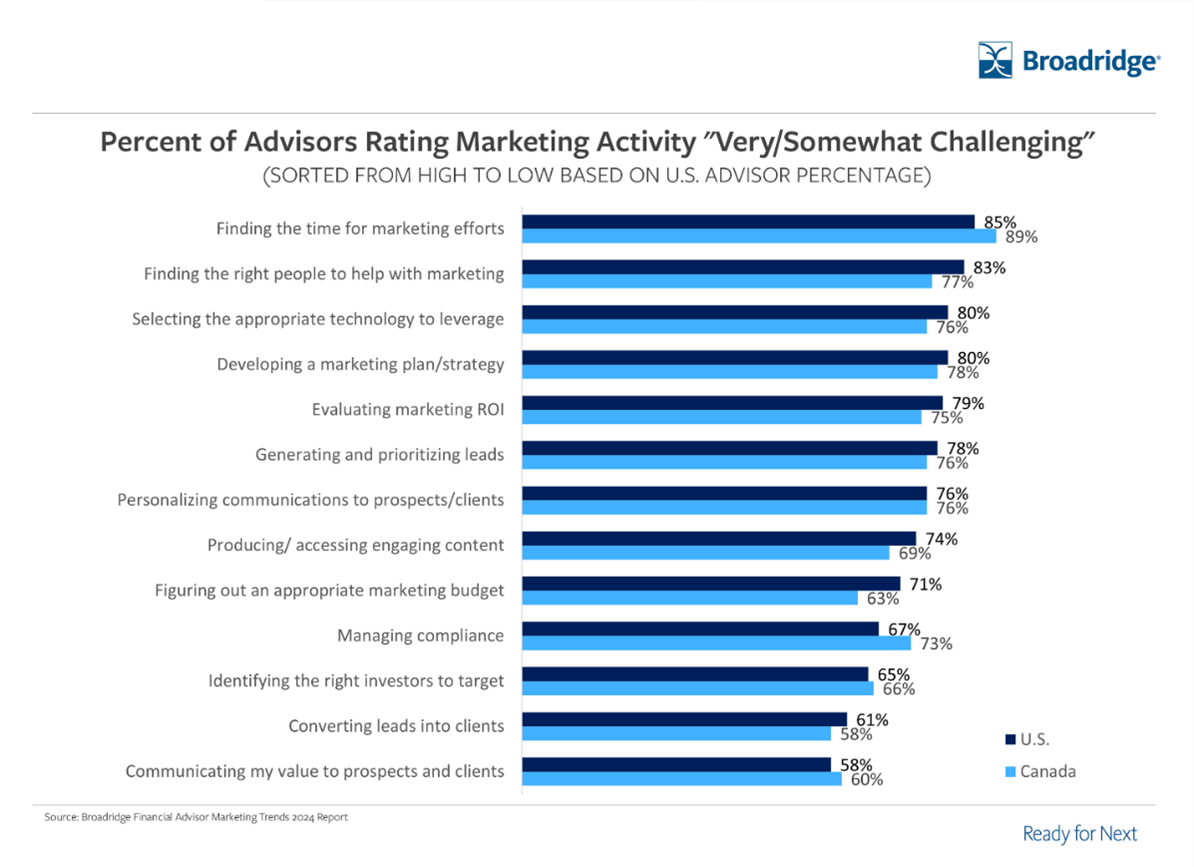Broadridge study highlights the marketing strategies of successful advisors

Financial advisors who are finding it hard to provide content marketing that clients are seeking, generative AI may provide the answer, according to a new study from Broadridge Financial Solutions.
Drawing on responses from registered financial advisors, the study highlighted that almost all respondents are struggling with creating and sharing educational content with lack of time or lack of expertise among the main reasons, along with a perceived lack of interest from clients, and compliance concerns.
But those that are succeeding are using next-gen tech such as AI to gain an advantage with 43% of U.S. respondents and 56% of those in Canada currently using or planning to use generative AI in digital marketing strategies.
“An advisor recently told me she no longer competes only with other advisors when building a sustainable practice with younger clients, she competes against TikTok influencers as well. 2023 was the year of generative AI, and tech-savvy advisors can break through the clutter as they develop use cases to better personalize their content and communications for multi-generational clients,” says Kevin Darlington, General Manager, Head of Broadridge Advisor Solutions. “However, many concerns and questions remain around the technology, so advisors should understand the risks and opportunities to leveraging generative AI in a digital marketing strategy to remain compliant while attracting prospects.”
Communicating more often and with personalized content at resonates with clients and prospective clients is driving advisor sentiment in reaching practice goals. Among those who are communicating at least once a quarter, 68% are confident in achieving these targets compared to only 51% of those whose communications are annual or less.
Personalization increases confidence to 71% versus 62% and also leads to better conversion rates from social media and generate more website leads, but those using it are more likely to be using generative AI, spend more time on marketing efforts, and have a defined marketing strategy (only 20% of all respondents do).
Having a clear strategy pays dividends with 70% of U.S. advisors and 63% of Canadian advisors saying that is has increased their inbound leads.
There is a direct correlation between advisors who spend more time on their marketing efforts, their levels of confidence, and the number of prospects they attract,” adds Darlington. “It simply shows that devoting the right amount of time to create a defined strategy drives measurable results, helps advisors map out their time commitment and allocate the appropriate resources before they set out to engage in marketing. Advisors should leverage the right tools and technology that can save them time, resources and allow them to be intentional with their efforts to get the highest ROI.”
Using technology
Use cases for generative AI include:
- generating personalized content
- developing personalized marketing campaigns
- automating administrative tasks and communications
- segmenting clients and prospects
Meanwhile, social media remains an important way to attract new clients, but the study shows investment intentions in this is higher among Canadian advisors than those in the U.S. due to a greater focus on engaging with Millennials and Gen Z clients.
Canadian advisors have also been more successful in converting social media leads to clients (44% vs. 39% of U.S. advisors), with LinkedIn and Facebook being the top two social media platforms for lead conversions across North America.



